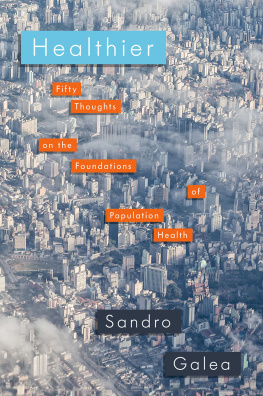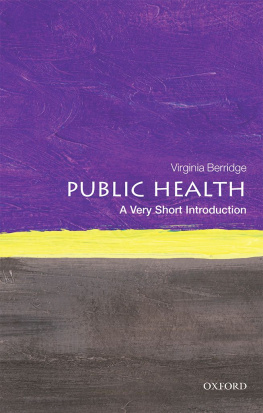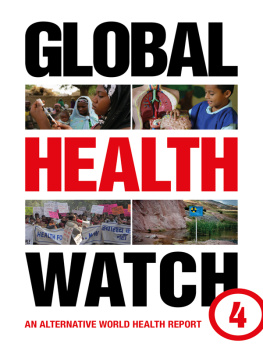HEALTHIER

Oxford University Press is a department of the University of Oxford. It furthers the Universitys objective of excellence in research, scholarship, and education by publishing worldwide. Oxford is a registered trade mark of Oxford University Press in the UK and certain other countries.
Published in the United States of America by Oxford University Press 198 Madison Avenue, New York, NY 10016, United States of America.
Oxford University Press 2018
All rights reserved. No part of this publication may be reproduced, stored in a retrieval system, or transmitted, in any form or by any means, without the prior permission in writing of Oxford University Press, or as expressly permitted by law, by license, or under terms agreed with the appropriate reproduction rights organization. Inquiries concerning reproduction outside the scope of the above should be sent to the Rights Department, Oxford University Press, at the address above.
You must not circulate this work in any other form and you must impose this same condition on any acquirer.
Library of Congress Cataloging-in-Publication Data
Names: Galea, Sandro, author.
Title: Healthier : fifty thoughts on the foundations of population health / Sandro Galea.
Description: Oxford ; New York : Oxford University Press, [2018] |
Includes bibliographical references and index.
Identifiers: LCCN 2017000248 (print) | LCCN 2017000552 (UPDF) |
ISBN 9780190662417 (pbk. : alk. paper) | ISBN 9780190662424 (UPDF) |
ISBN 9780190662431 (EPUB)
Subjects: | MESH: Social Medicine | Health Status | Public Health Practice | Health Equity
Classification: LCC RA418 (print) | LCC RA418 (ebook) | NLM WA 31 | DDC 362.1dc23
LC record available at https://lccn.loc.gov/2017000248
This material is not intended to be, and should not be considered, a substitute for medical or other professional advice. Treatment for the conditions described in this material is highly dependent on the individual circumstances. And, while this material is designed to offer accurate information with respect to the subject matter covered and to be current as of the time it was written, research and knowledge about medical and health issues is constantly evolving and dose schedules for medications are being revised continually, with new side effects recognized and accounted for regularly. Readers must therefore always check the product information and clinical procedures with the most up- to- date published product information and data sheets provided by the manufacturers and the most recent codes of conduct and safety regulation. The publisher and the authors make no representations or warranties to readers, express or implied, as to the accuracy or completeness of this material. Without limiting the foregoing, the publisher and the authors make no representations or warranties as to the accuracy or efficacy of the drug dosages mentioned in the material. The authors and the publisher do not accept, and expressly disclaim, any responsibility for any liability, loss or risk that may be claimed or incurred as a consequence of the use and/ or application of any of the contents of this material.
This book is dedicated, as always, to Isabel Tess Galea, Oliver Luke Galea, and Dr. Margaret Kruk.
Contents
THE CHAPTERS IN this book benefitted from the contributions of many, and I am grateful to all my collaborators on the book. Three sets of thanks are due in particular. First, this book would not have been possible without the work of Eric DelGizzo, whose contributions are felt on every page and on all chapters here. Thank you. Second, the following colleagues contributed to particular chapters; Salma Abdalla (
HEALTH MATTERS. A CONCERN with our health and well-being crosses national, partisan, and ideological divides. Our concern with health has led us to remarkable achievements that have made for a healthier world during the past century. Life expectancy worldwide is higher than it has ever been. In the past century alone, we have increased life expectancy by a mind-boggling 30 years after centuries during which life expectancy was more or less stagnant. We have dramatically reduced death from infectious disease, and large numbers of people worldwide have access to quality medical care when they need it. Yet, our health achievements leave much to be desired. Although life expectancy has increased overall, billions of people continue to die prematurely, and substantial healthy life years are lost worldwide due to disease or disability. Our collective health achievement is marred by tremendous gaps, with global life expectancy ranging from a high of 83 years in Japan to a low of 47 years in Malawi. The United States has worse health metrics than nearly all other high-income countries, even as the country spends far more on health than any other country worldwide. Population health in the United States is characterized by racial/ethnic and socioeconomic gaps, despite decades of study and effort to narrow these disparities. These successes, and failures, are all the remit of public health.
At heart, public health is concerned with the social, economic, cultural, and political conditions that shape the health of populations. The vast majority of health achievement during the past century is attributable to an improvement in these conditions: to better living conditions in cities, improved educational status for women and men, safer water and sanitation, availability of nutrient-rich food, stable housing and shelter, and reduction in violence and injury. Conversely, our shortcomings represent our failure to tackle the social dividesacross countries and within countriesthat become health divides. This is compounded by our mis-investment of resources in curative care and away from education, physical and social conditions of cities, social justice, and efforts at disease prevention that create the conditions for healthy populations.
These concerns have long animated my career in public health and inform this book. This collection of essays, written during a 2-year period, aims to tackle foundational concerns that I think should be of interest to anyone engaged with the work of promoting the health of populations. The book is divided into five sections. The first section is concerned with foundations, addressing some of the core principles that underlie the work of public health and that must inform how we go about improving the health of populations. The second section presents essays about the world as it is, about conditions that keep populations from being healthy, and about particular conditions that characterize unhealthy populations. The third section focuses on a topic that I consider core to any study of population health: inequities, with a particular focus on marginalized populations. The fourth section addresses some of the fundamental challenges faced by public health, ranging from methodological to conceptual issues. The final section looks ahead, toward better population health, inhabiting our aspirations toward a healthier world.
Any collection of essays such as this one is inevitably shaped by an authors experiences and perspectives. Hence, a few notes and caveats. First, I write this book from the perspective of someone who has long engaged in scholarship about the health of populations, working principally within academic schools of public health. As such, this book frequently asks the following question: What can academic public health do to tackle any particular issue? I hope that the chapters in this book are illuminating for colleagues within academic public health who may themselves be grappling with these issues. It is my hope, however, that these concerns are universal enough as to be equally interesting to anyone who is engaged in the population health enterprise in general. Reflecting this orientation, I generally use the term public health to refer to the discipline whose remit it is to work toward improving the health of populations, whereas I use the term population health to mean the subject of interest itself. Second, although this book explicitly takes a global lens, much of the focus is domestic, looking at the United States experience. This is as much a function of my engagement within a US school of public health and our peer community as it is with the challenges facing the United States at this point in time. Third, this book makes no effort at being comprehensive. There are certainly many more issues that can be raised within each of the sections in this book. The issues that I do raise reflect a combination of issues that I think are most important and ones about which I feel qualified to comment. I leave it to others to fill in the gaps. Fourth, this book is a reflection of a particular time and place, embedded within contemporary concerns. I have no doubt that some issues that I tackle will fade in importance over time, whereas other issues will rise in importance, making their omission in this book glaring.











